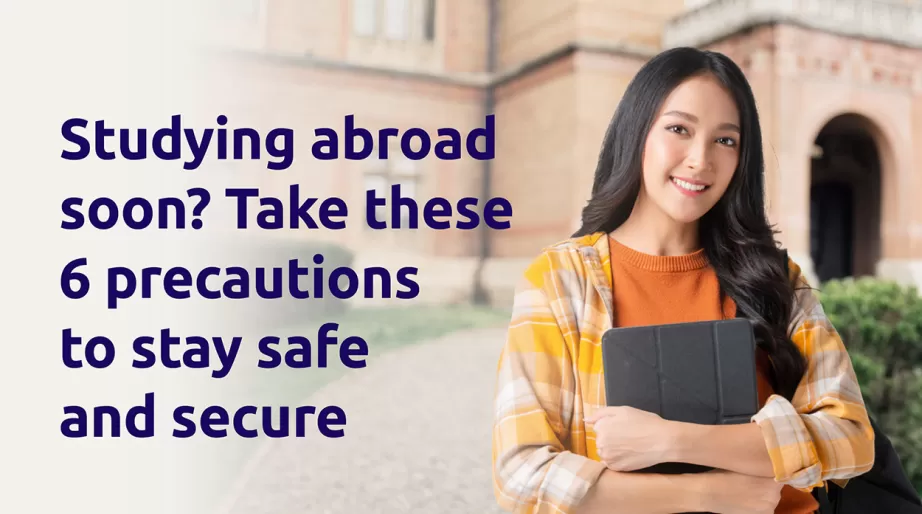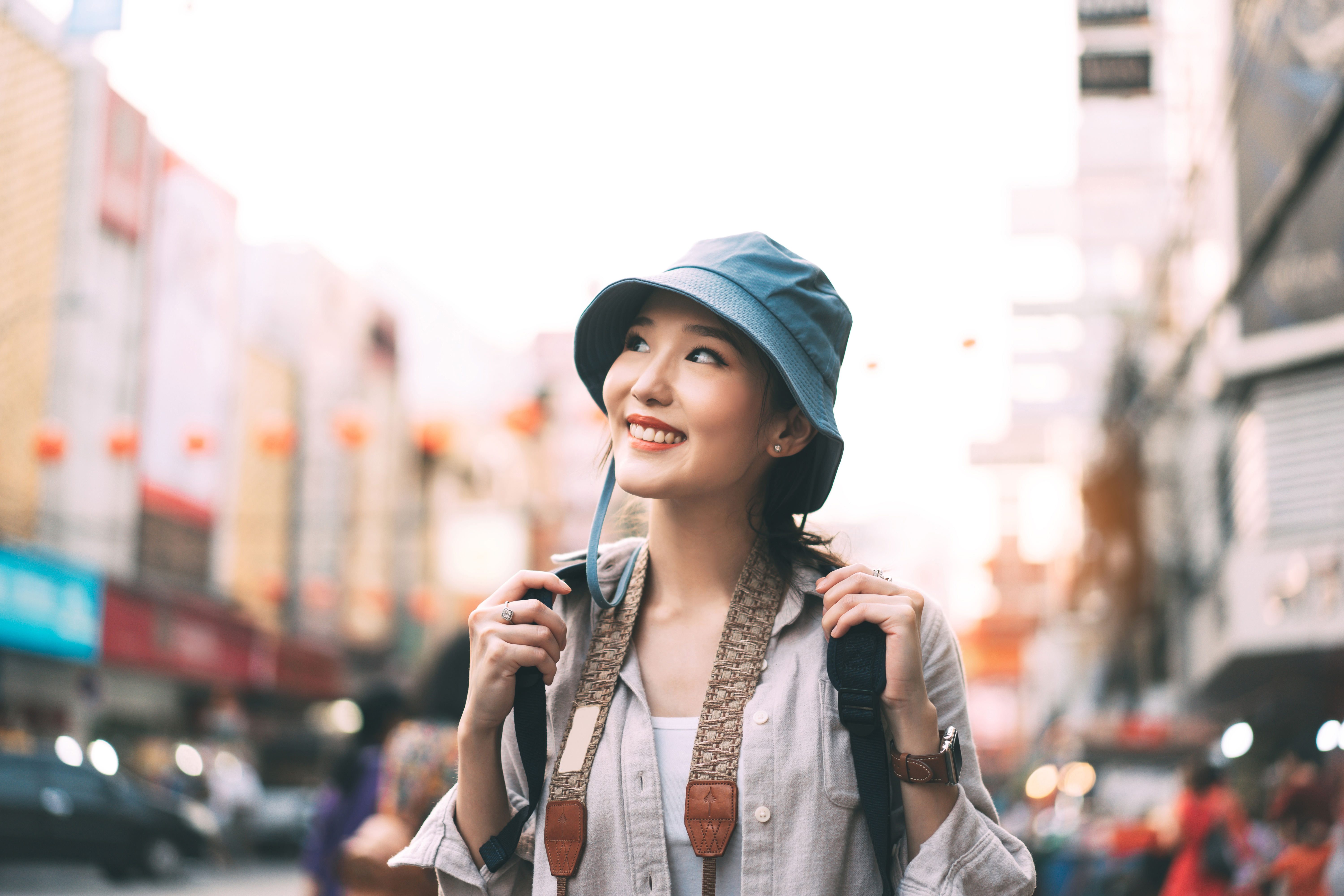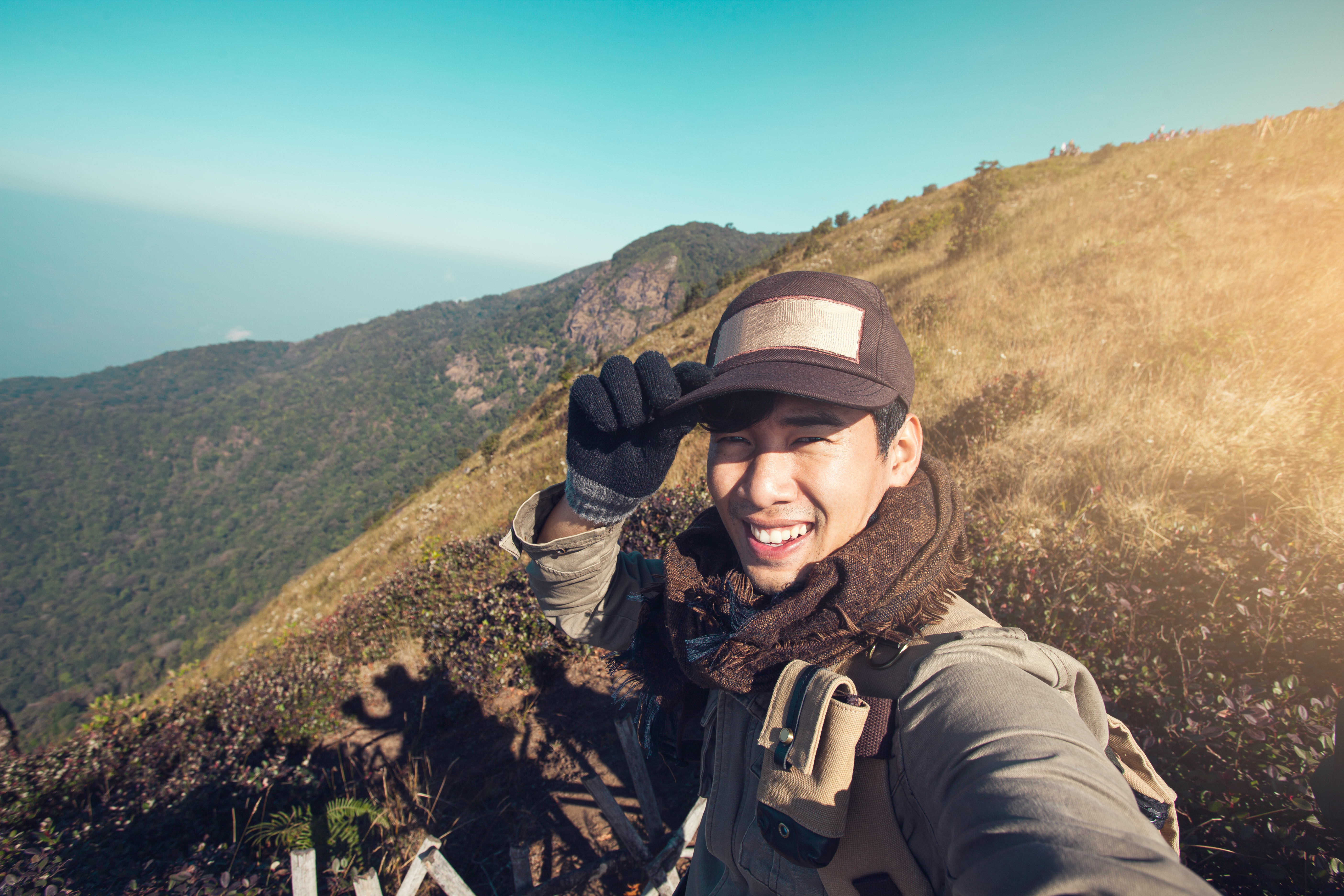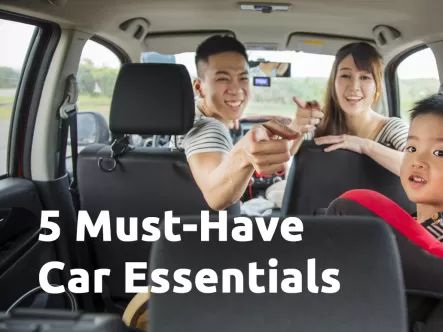Studying abroad soon? Take these 6 precautions to stay safe and secure


8-minute read | Last updated: July 2023
Studying overseas can be quite an adventure. For most, it’s your first time living independently away from your parents. It’s an exciting opportunity to discover who you are and mature into adulthood. The world is your oyster, and you finally have the freedom to explore it to the fullest.
But this change can also be daunting. You’re alone in an unfamiliar place where the culture differs from home. Your family isn’t physically there to take care of your immediate needs. On top of your studies, which can already be stressful, you become solely responsible for your food, admin, finances, well-being, and fighting any “fires” that spontaneously start. And what if your global study experience got disrupted due to a severe injury or illness, a lockdown (remember COVID-19?), or other unforeseen circumstances?
So, is studying abroad not worth the risk? Of course, it still is! Studying overseas comes with many more benefits than threats. It's just a matter of well-preparing yourself for what’s to come.
Read on for 6 tips to help navigate living abroad, be ready for the unexpected, and ensure your safety over the course of your studies.

1. Know the country’s political situation, laws, and regulations.
Unlike Singapore, which recently ranked the 3rd safest and most secure country to live in, safety isn’t guaranteed in other parts of the world. A 2022 survey showed that 85% of university students worry about their safety in other countries. Before deciding on a destination for your studies, it’s vital to do a thorough check on the country.
Entry into the country
While travel restrictions to Singapore have eased, some countries still require you to clear health checks before applying for a visa. Check the visa requirements and validity in advance, and apply early as processing and approval time varies from country to country.
Political stability and general safety
Avoid countries with tense political situations to deter being caught in violent attacks or countrywide lockdowns. Keep up with global news and check the Ministry of Foreign Affairs (MFA) website for safety advice on travelling to various places. For instance, MFA highly encourages the deferring of all non-essential travel to Russia in view of the current Russia-Ukraine conflict.
Local laws and customs
Being a foreigner doesn’t exempt you from obeying the local rules. Know and follow the local laws to stay out of trouble. (MFA’s website also details the do’s and don'ts for certain countries.) For instance: Did you know that it’s illegal for a driver or passenger not to wear a seatbelt in Australia? Or that completely concealing your face is illegal in France?
Familiarising yourself with cultural norms will help with assimilating more easily. Many international students feel homesick largely because they find fitting in a challenge. Knowing what’s appropriate demonstrates that you respect the country’s culture – and ensures that you don’t accidentally offend any local.

2. Speak the language and make trusted friends.
Local language
Communicating is much easier when you know some of the country’s local languages, especially if you’ll be staying there for an extended period of time. Just like how we Singaporeans have Singlish, pick up some local slang and phrases to break the ice with locals. Knowing some vocabulary will also help you to navigate the country more easily.
Making friends
The safest way to enjoy your global study experience to the fullest is by making friends with local students. Apart from feeling less lonely, you’ll have friends you can trust for tips and recommendations and who can travel around with you.
As a well-connected nation, Singaporean students are spread out worldwide. Many universities across the globe have on-campus clubs/ societies for Singaporean students to gather and mingle. Sometimes, they even have events celebrating local arts and food culture, a win for Singaporean students with beef rendang or chicken rice cravings!
3. Prepare for emergencies and unforeseen circumstances.
Emergency personnel
Find out where the closest police station, hospital and other emergency facilities to your accommodation are. Keep a handy list of important emergency numbers – the Singapore embassy, police, ambulance, university, and family members – in case your phone isn’t with you. Also, learn emergency phrases in the local language to ask for help if needed.
Important documents
Keep your important documents secure. However, don’t panic if they get lost or stolen. Prepare scanned or digital copies of your passport, visas, ticket confirmations and other key documents; this also makes getting replacements easier.
► What should I do if my passport gets lost/ stolen in the country?
If you’ve lost your passport, follow MFA’s step-by-step procedure to learn how to cancel your passport and make a replacement.
If your document has been stolen, make a police report within 24 hours. MSIG’s Global Study Insurance covers the cost of getting replacement passports, travel tickets and other relevant travel documents because of theft or natural disaster.

4. Don’t launch into risky situations headfirst.
Adventurous activities
You’re in a new land! Your first instinct may be to go all out. But don’t recklessly rush into adventure. Fully know the risks before attempting any dangerous activities like cliff diving, bungee jumping, or skydiving. If you don’t feel confident, don’t do it! If you’re booking an experience through a company, read the reviews to know if the company is reputable and safe.
► What should I do if I get into an accident from an adventurous activity?
Regardless of the injury’s severity, seek medical attention immediately. Request for emergency medical services or call for an ambulance to the nearest hospital. When you can, update your family on what has happened.
Once you’re in proper care and have seen the doctor, document the accident as best as possible, as you’ll never know if there will be legal recourse. This will also help with your insurance claim. Our Global Study Insurance’s premium plan covers injury caused by an extensive list of adventurous activities, done for leisure with a licensed operator.
► What should I do if my studies get interrupted?
If you’re hospitalised for a prolonged period, and your studies are rudely interrupted, we have your back. Our plan covers your unused tuition fees, charges and deposits, unused travel fares, accommodation, and deposits, as well as your travel back home to Singapore.
Getting around
Not all places are as well-connected as tiny Singapore. Often, getting from Point A to B, unless they’re conveniently located by train stations, will take some transfers and walking. Be sure to look for the most direct and safest routes to take. If you get lost, stay calm and approach a local for directions to your destination.
Keep out of dingy neighbourhoods known to be unsafe. Avoid going to unfamiliar places by yourself and staying out until late at night. Also, never go anywhere alone with a stranger, even if they seem nice. If you feel unsafe, walk into a public place with high visibility and large groups of people.
Finally, even if you’re curious, stay away from protests or civil unrest as they can turn violent spontaneously without warning.
Losing personal valuables
Pickpocketing is a common occurrence overseas. The best way to deter it is to avoid drawing attention to yourself. Don’t dress flashily and only carry what you’ll need for the day, keeping your valuables concealed. Stay vigilant when moving through crowded areas where you’ll likely brush against others.
When overseas, abandon the Singaporean habit of “choping” and leaving your items unattended. Once your belongings are out of sight, there’s a high chance they won’t be there when you return.
► What should I do if I experience theft?
If your wallet or phone has been stolen, immediately cancel your credit cards and/or mobile SIM service. Make a detailed police report as soon as possible. If your passport has been stolen, follow the instructions above in Point 3.
While our Global Study Insurance doesn’t cover accidental loss of items, it does cover loss of personal belongings from your overseas residence. So, if you come home to find your door ajar and your room ransacked, rest assured that you’ll get some compensation.
5. Keep family and friends back home updated.
Whether in Singapore or overseas, this same rule applies: let people know where you are. Before leaving for your studies, be sure to register your travel with the MFA so that the government knows how to reach you in case of emergencies.
When overseas, make it a habit to share your whereabouts or ride details with a friend or family member to keep tabs on you. iPhone users can easily share their location with family if they have Family Sharing set up. Messaging apps like WhatsApp and Telegram also make sharing one’s live location via text easy.
6. Get a comprehensive Global Study Insurance.
The best way to stay safe is to cover all bases with good insurance for your overseas studies. MSIG’s Global Study Insurance offers wide coverage of accidents and medical expenses that you might incur while studying abroad. The plan even covers your pre-paid course fees should your studies be interrupted by illness or injury.
If any accidents or mishaps happened, calmly collect the incident details and submit the report to us for claims. We’re here to ensure that your overseas study experience is as smooth and enjoyable as possible.
Remember, your global study is not meant to be anxiety-inducing. Sure, you may make mistakes occasionally, but that’s part of life. Be adventurous but careful, take precautions, and have fun exploring this chapter of your life!
► How do I make a claim?
If you are overseas and require any emergency assistance, you can call our 24-hour MSIG Assist at +65 6323 8288. If you wish to file a claim on your insurance, you must do so within 30 days of any event giving rise or likely to give rise to a claim. You can download the claim form or submit your claims here.



